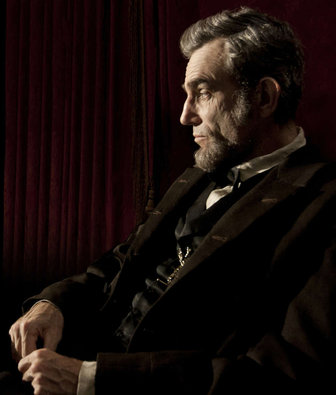Philadelphia Inquirer – January 31, 2013
On this last day of January in 1865, the House of Representatives passed a proposal for a constitutional ban on slavery. In Steven Spielberg’s latest film, Abraham Lincoln is the consummate politician who, in the midst of a great war and facing determined resistance in Congress, made it happen.
But before we join the “Why can’t President Obama be more like Lincoln?” chorus, it’s worth noting that the 13th Amendment was less a great leap forward than a single conflicted step.
Daniel Day Lewis in Steven Spielberg’s “Lincoln.”
It reads, “Neither slavery nor involuntary servitude, except as a punishment for crime whereof the party shall have been duly convicted, shall exist within the United States, or any place subject to their jurisdiction.” But not a word is said about the post-slavery legal status of the roughly 3.8 million people who became known as freedmen.
While the amendment was still working its way through the ratification process, the white South went ahead and filled in the blanks. Under their “black codes,” freedmen were granted certain privileges, such as the right to sue, to act as witnesses in court, and to legally marry, but they were expressly denied others, such as the right to bear arms and to peacefully assemble. The economic restrictions embodied in the codes bound the freedmen in most cases to a white person by contract, using as models the traditional systems of indenture and apprenticeship. Most insidious were the parts of the codes relating to vagrancy and guided, tragically, by the wording of the 13th Amendment itself. The outlawing of involuntary servitude “except as punishment for a crime,” opened the door to the widespread exploitation of blacks (and poor whites) as convict labor.
In 1868, the North finally issued its own answer to the question — What were the freedmen? — with the 14th Amendment, which made them citizens of the United States. “No State shall make or enforce any law which shall abridge the privileges or immunities of citizens of the United States,” it read, “nor shall any State deprive any person of life, liberty, or property, without due process of law; nor deny to any person within its jurisdiction the equal protection of the laws.”
On paper at least, these expansive phrases extended the protection of the Bill of Rights to all Americans. But the freedmen could only defend these rights if they could vote and, as the historian and sociologist W.E.B. Du Bois observed, in 1865, “not a single Southern legislature stood ready to admit a Negro, under any conditions, to the polls.”
For a time, with the support of Union troops, many freedmen did vote, but Northern appetite for continued occupation waned. In 1870 the North added the 15th Amendment to the Constitution, stating that neither race nor “previous condition of servitude” could be used to exclude (male) citizens from the franchise.
Sadly, even good laws are only as effective as our willingness to abide by them. A quarter of a century later, DuBois wrote, “despite compromise, war, and struggle, the Negro is not free…. In well-nigh the whole rural South the black farmers are peons, bound by law and custom to an economic slavery, from which the only escape is death or the penitentiary.”
Every January 31 we should recognize the achievement of Lincoln and his allies, but we should also remember that no matter what the president and Congress do, making this Great Experiment work remains up to us.



Very interesting & informative. I too saw the movie & you failed to mention one thing. The total disregard by the Democrats to pass it. Lincoln & the Republicans had to bribe,cajole & promise almost anything to get the 20 lousy Democrats to join them. As you probably know, when the Whig party disappeared the Republican party was formed in 1854 to opposed slavery,yet that is never mentioned in any articles as well as this recent election. Maybe, that is how they get the Freedmen to kept voting Democrat,by keeping them in the dark
You are certainly right that in 1865 the Democrats were not lining up in support of ending slavery. Before the war the Republican Party was opposed to the expansion of slavery, but, as far as I know, they didn’t say anything official about wanting to end it.
If, as you say, the Democratic Party is currently keeping African American voters in the dark, then the Republicans should take full advantage of the opportunity to expose them.
Between the main stream media & the fact that nobody reads anymore, most people are in the dark & will stay that way.
I especially liked the final sentence of your piece. It is the most important aspect of our system and most important for young Americans to understand.